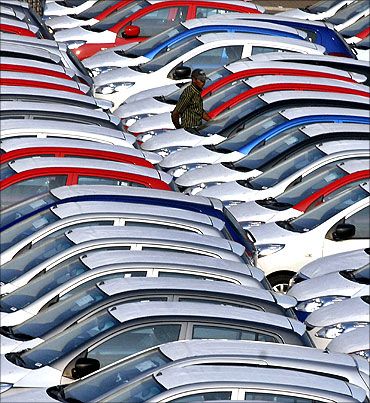 Pune-based IT professional Anurag Mohan's decision to buy the diesel Maruti Suzuki Swift on advice of friends and family may not give him the advantage he is looking for.
Pune-based IT professional Anurag Mohan's decision to buy the diesel Maruti Suzuki Swift on advice of friends and family may not give him the advantage he is looking for.
The narrowing gap between petrol and diesel prices and the 20-25 per cent premium charged over petrol variants are making diesel car models unviable.
According to a report by rating and research agency CRISIL, it now takes six years to recover the premium-between Rs 100,000 on small cars and Rs 300,000 on luxury sedans-paid for diesel variants.
This is more than double the time it would have taken three years ago.
"If one also factors in the time value of money, recovering the premium will take even longer. Buying a diesel car today does not make financial sense, unless justified by use.
"We expect the average petrol-to-diesel price ratio to reach a decadal low of 1.2 in this fiscal, and remain thereabouts on full (diesel) deregulation," added the CRISIL report.
But as manufacturers push newer models into showrooms almost every month, the class of buyers who hold on to their cars for six years is small.
Typically, replacement buyers switch to a new car in three to four years. Once a rage among buyers, diesel cars have been losing their following for over a year now. Cars with smaller yet powerful petrol engines delivering as much mileage as their diesel counterparts are finding buyers.
From a high of 58 per cent during 2012-13, the share of diesel cars shrank to 53 per cent in 2013-14 and was expected to close this year at 45 per cent, which would be going back to the levels of 2011-12, according to the CRISIL report.
The government began raising the price of diesel by 50 paise a month from early 2013. The move to deregulate petrol allowed consumers to enjoy frequent cuts in its price. At present, the gap between the two fuels is Rs 9.54, compared with Rs 26 three years ago.
Maruti Suzuki, India's largest car maker, has dropped plans to spend Rs 1,700 crore to expand its diesel engine plant. A Fiat India executive confirmed diesel engine purchases by Maruti Suzuki had slowed down in the last few months.
| NO MORE A DZIRE? |
|
The share of sales of the Honda Amaze diesel version was 80 per cent, this has come down to 50 per cent now. The City, too, has a similar ratio. The Mobilio, sells 80 per cent in diesel for its people carrying abilities.
Sedans and sports utility vehicles that were powered by diesel are now coming in petrol variants. Ford EcoSport, for example, offers a choice of two petrol engines and one diesel.
Utility vehicle market leader Mahindra & Mahindra has plans to develop small petrol engines that will power its next generation of cars. CNG and LPG variants also have found buyers in metros where the fuels are available. Maruti Suzuki's Wagon R hatchback, not available with in diesel but with a petrol-LPG variant, is witnessing strong demand.












 © 2025
© 2025